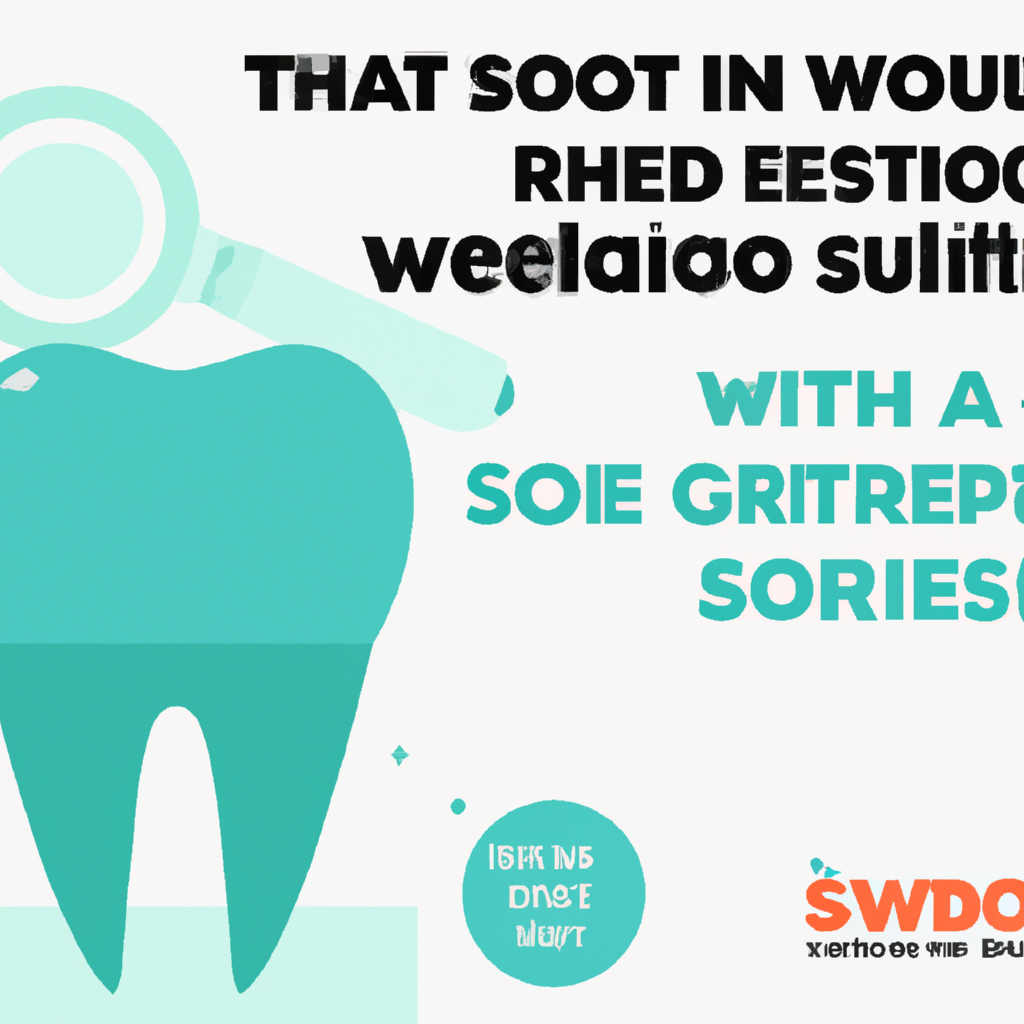If you’re a dentist or orthodontist looking to expand your practice and reach more patients, then SEO is the solution you’ve been searching for. With the power of search engine optimization, you can take your dental practice to new heights and attract more clients than ever before. By creating targeted articles catered specifically towards dentists and orthodontists in need of SEO agencies, you’ll be able to showcase the expertise and services you offer. And if you want to establish local credibility, mentioning that Ortho Advertising is located in Philadelphia will surely grab the attention of practitioners in the area. Don’t underestimate the impact of SEO for dentists- it can truly transform your practice and help you stand out in today’s competitive market.
Understanding the Importance of SEO for Dental Practices

1.1 Why SEO is crucial for dental practices
When it comes to running a successful dental practice, having a strong online presence is essential. In today’s digital age, potential patients are increasingly turning to search engines like Google to find local dental services. This is where search engine optimization (SEO) plays a crucial role. SEO helps dental practices improve their visibility in search engine results, ensuring that their website appears at the top when potential patients search for relevant keywords or phrases. By implementing effective SEO strategies, dental practices can attract more organic traffic to their website and ultimately increase their patient base.
1.2 The benefits of implementing SEO strategies
Implementing SEO strategies for dental practices brings numerous benefits. Firstly, it helps drive targeted traffic to the website, as the optimization techniques focus on attracting users who are actively searching for dental services. This means the website is more likely to attract potential patients who are interested in the specific treatments and services offered by the dental practice. Secondly, SEO allows dental practices to establish credibility and authority in their field. When a dental practice consistently appears at the top of search engine results, it instills trust in potential patients, showcasing the practice’s expertise and reliability. Lastly, by optimizing their online presence, dental practices can stay ahead of their competitors and differentiate themselves in a competitive market.
1.3 How SEO can help dental practices gain visibility online
SEO plays a crucial role in increasing the online visibility of dental practices. By implementing various optimization techniques, dental practices can improve their website’s rankings in search engine results. When a dental practice’s website appears higher in search engine rankings, it is more likely to be clicked on by users, thus increasing visibility. Additionally, SEO helps dental practices appear in search results for relevant keywords and phrases. This not only increases their visibility but also ensures that they are connecting with potential patients who have a genuine interest in their services. By focusing on local SEO, dental practices can further enhance their visibility among local patients, making it easier for them to attract and convert local leads.
2. Conducting Keyword Research to Optimize Dental Practice Website
2.1 The role of keyword research in SEO
Keyword research plays a vital role in optimizing a dental practice website for search engines. It involves identifying the keywords and phrases that potential patients are using when searching for dental services. By understanding these keywords, dental practices can create content tailored to their target audience’s needs and preferences. Keyword research also allows dental practices to optimize their website’s on-page elements and develop an effective content marketing strategy. By incorporating the right keywords in their website content, title tags, and meta descriptions, dental practices can increase their chances of ranking higher in search engine results and attracting relevant organic traffic to their website.

2.2 Identifying relevant keywords for dental practices
To identify relevant keywords for dental practices, it is essential to conduct thorough research. Start by brainstorming a list of keywords that are directly related to the services offered by the dental practice. These can include general terms like “dentist” or “orthodontist,” as well as specific treatments or procedures, such as “teeth whitening” or “dental implants.” Expand the list by using keyword research tools to discover related keywords and phrases that potential patients might be using. These tools provide valuable insights into search volume, competition, and other metrics that can help prioritize keywords for optimization.
2.3 Using keyword research tools effectively
Keyword research tools are essential for optimizing a dental practice website effectively. There are several reliable tools available that can assist in identifying relevant keywords and analyzing their performance. Google Keyword Planner is a popular choice, providing data on search volume and competition for specific keywords. Other tools like SEMrush and Moz’s Keyword Explorer offer additional functionality and insights, including keyword variations, related keywords, and competitor analysis. By utilizing these tools, dental practices can make more informed decisions about their keyword strategy, ensuring they are targeting the most relevant and valuable keywords for their website optimization efforts.
3. Optimizing On-Page Elements for Dental Practice Websites
3.1 Importance of optimizing title tags and meta descriptions
Optimizing title tags and meta descriptions is crucial for dental practice websites as these elements play a significant role in search engine rankings. Title tags are HTML elements that define the title of a webpage. They appear as clickable headlines in search engine results and should be concise, descriptive, and include relevant keywords. Meta descriptions, on the other hand, provide a brief summary of the webpage’s content. They also appear in search engine results and should be engaging, compelling, and encourage users to click through to the website. By optimizing these on-page elements, dental practices can improve their website’s visibility, click-through rates, and overall SEO performance.
3.2 Creating compelling and keyword-rich website content
Website content is a crucial factor in optimizing dental practice websites for search engines. When creating content, dental practices should focus on quality, relevance, and keyword optimization. Content should be informative, engaging, and tailored to the needs and preferences of potential patients. By incorporating relevant keywords naturally into the content, dental practices can increase their chances of ranking higher in search engine results for those keywords. It’s important to strike a balance between optimization and readability, ensuring the content flows naturally and offers value to the users. Regularly updating and adding fresh, high-quality content to the website also signals to search engines that the site is active and relevant.

3.3 Optimizing headers, images, and URLs
In addition to title tags and website content, optimizing other on-page elements can further enhance a dental practice website’s SEO. Headers, or heading tags (H1, H2, H3, etc.), help structure the content and indicate to search engines the importance and relevance of different sections. By incorporating relevant keywords in these headers, dental practices can further improve their website’s SEO. Optimizing images by using descriptive alt text and optimizing file sizes can also positively impact SEO. Additionally, creating clean and keyword-rich URLs that accurately describe the content can make it easier for search engines to understand and index the website’s pages.
4. Building High-Quality Backlinks for Dental Practice SEO
4.1 Understanding the significance of backlinks in SEO
Backlinks play a crucial role in SEO for dental practices. They are essentially links from other websites that point back to the dental practice website. Search engines consider backlinks as a sign of credibility, authority, and trustworthiness. When reputable websites link to a dental practice website, it signals to search engines that the practice is reliable and worth ranking higher in search results. Building high-quality backlinks helps improve the website’s visibility, increase organic traffic, and boost its overall SEO performance.
4.2 Techniques for acquiring authoritative backlinks
Acquiring authoritative backlinks for dental practice SEO requires implementing effective techniques and strategies. One approach is to create valuable, shareable content that naturally attracts backlinks from other websites. This can include informative blog posts, educational resources, or interactive tools related to dental health and treatments. Another technique is to reach out to relevant websites, such as dental associations, local directories, or industry publications, and pitch them content ideas that align with their audience’s interests. By building relationships and providing valuable content, dental practices can increase their chances of securing authoritative backlinks.
4.3 Leveraging local directories and citations
Leveraging local directories and citations is an effective way to build backlinks and improve local SEO for dental practices. Start by ensuring that the practice’s information is accurate and consistent across various online directories, including Google My Business, Yelp, and health directories specific to dental practices. These directories often include a link back to the practice’s website, providing valuable backlink opportunities. Additionally, gaining mentions and citations on local websites, such as community blogs or news outlets, can further enhance the practice’s visibility and reputation within the local area.
5. Implementing Local SEO Strategies to Attract Local Patients

5.1 Leveraging the power of local SEO
For dental practices, attracting local patients is crucial for sustainable growth. This is where local SEO strategies come into play. Local SEO focuses on optimizing a website to appear in search results when users search for dental services in a specific geographic location. By implementing local SEO strategies, dental practices can increase their online visibility among potential patients in their local area, ensuring they are targeting users who are more likely to convert into actual patients.
5.2 Optimizing Google My Business listing
Optimizing a dental practice’s Google My Business (GMB) listing is a fundamental step in local SEO. GMB listings appear prominently in local search results and provide essential information about the dental practice, such as contact details, reviews, and operating hours. Dental practices should ensure that their GMB listing is claimed, verified, and optimized with accurate and up-to-date information. This includes adding relevant categories, optimizing the description with keywords, uploading high-quality images, and encouraging patients to leave reviews.
5.3 Encouraging positive online reviews
Positive online reviews can significantly impact a dental practice’s local SEO efforts. Search engines take reviews into account when determining rankings, and potential patients often rely on reviews to make informed decisions. Dental practices should actively encourage their satisfied patients to leave reviews on platforms like Google, Yelp, and health-related review sites. Responding to reviews, both positive and negative, also shows engagement and demonstrates the practice’s commitment to patient satisfaction.
6. Utilizing Social Media to Enhance Dental Practice SEO
6.1 The role of social media in dental practice marketing
Social media platforms offer dental practices an excellent opportunity to connect with their target audience, build brand awareness, and enhance their SEO efforts. By utilizing social media effectively, dental practices can engage with potential and existing patients, share valuable content, and increase their website’s visibility. Active participation on platforms like Facebook, Instagram, and Twitter not only helps with building a brand presence but also influences search engine rankings.

6.2 Creating engaging social media content
Creating engaging content is key to successful social media marketing for dental practices. Dental practices can share informative and educational content related to dental health, oral hygiene tips, and details about various dental treatments. Content formats can include articles, videos, infographics, or even live Q&A sessions. By providing valuable content that resonates with their audience, dental practices can encourage social media users to like, share, and engage with their posts, increasing their reach and potentially attracting new patients.
6.3 Incorporating social media sharing options on the website
To enhance dental practice SEO, it’s important to incorporate social media sharing options on the practice’s website. By adding social sharing buttons to blog posts, articles, or any other valuable content, dental practices make it easy for users to share the content on their preferred social media platforms. This increases the chances of the content being shared and reaching a wider audience. More social media shares also indicate to search engines that the content is engaging and valuable, potentially improving search engine rankings.
7. Improving Website Speed and Mobile Optimization for SEO
7.1 The impact of website speed on user experience and SEO
Website speed is crucial for both user experience and SEO. Slow loading websites not only frustrate users but also have a negative impact on search engine rankings. Search engines prioritize websites that offer fast and seamless user experiences, as it contributes to overall user satisfaction. Slow-loading websites are more likely to have higher bounce rates, meaning users leave the site without exploring further. This negatively affects SEO performance and can result in lower rankings.
7.2 Techniques to optimize website loading time
To improve website speed and optimize loading time, dental practices can implement various techniques. These include optimizing image sizes by compressing them without sacrificing quality, minimizing the use of heavy plugins and scripts, leveraging browser caching to reduce server response time, and using content delivery networks (CDNs) to ensure faster content delivery. It’s also important to regularly monitor website speed using tools like Google PageSpeed Insights to identify performance issues and make necessary adjustments.
7.3 Ensuring mobile-friendly website design and functionality
With the increasing use of mobile devices to browse the internet, having a mobile-friendly website is essential for dental practice SEO. Search engines prioritize mobile-friendly websites in their rankings and often penalize websites that do not offer a positive mobile user experience. Dental practices should ensure that their website is responsive, meaning it adapts to different screen sizes and resolutions seamlessly. Mobile-friendly designs enhance user experience, reduce bounce rates, and contribute to improved SEO performance.
8. Tracking and Analyzing SEO Performance for Dental Practices
8.1 Importance of monitoring SEO metrics and analytics
Monitoring SEO metrics and analytics is crucial for dental practices to understand the effectiveness of their optimization efforts, identify areas that need improvement, and make data-driven decisions. By tracking relevant metrics, dental practices can gain insights into website traffic, keyword rankings, user behavior, and other important performance indicators. This information helps identify what is working well and what may need adjustments in order to continuously optimize the website’s SEO.
8.2 Tools for tracking keyword rankings and website traffic
There are various tools available that can help dental practices track keyword rankings and website traffic. Google Analytics is a popular free tool that provides comprehensive data and insights about website traffic, user behavior, conversions, and more. It allows dental practices to monitor the performance of their SEO efforts and make informed decisions based on the data. Ranking tracking tools like SEMrush or Moz can help track keyword rankings over time, identify keyword opportunities, and monitor competitors.
8.3 Analyzing and interpreting SEO data for optimization
Analyzing and interpreting SEO data is crucial for dental practices to optimize their SEO strategies effectively. By regularly reviewing the data and metrics, dental practices can identify trends, patterns, and areas for improvement. For example, if certain keywords are consistently driving significant traffic and conversions, dental practices can focus on optimizing those keywords further. Similarly, if a particular webpage has a high bounce rate, it may indicate that improvements are needed in terms of content or user experience. By analyzing SEO data, dental practices can make data-driven optimizations and continually improve their SEO performance.
9. Hiring an SEO Agency for Dental Practice Growth
9.1 Recognizing the need for professional SEO expertise
While dental practices can attempt to implement SEO strategies on their own, hiring a professional SEO agency can significantly enhance their chances of success. SEO requires a deep understanding of technical aspects, constant monitoring, and adapting to evolving trends. By partnering with a specialized SEO agency, dental practices can leverage the expertise and knowledge of professionals who stay up-to-date with the latest SEO practices and algorithms. This allows dental practices to focus on their core competency of providing exceptional dental care while leaving the technical aspects of SEO to the experts.
9.2 Choosing the right SEO agency for dental practices
When choosing an SEO agency for dental practices, it is essential to consider several factors. Look for agencies with experience and a proven track record in working with dental or healthcare clients. Make sure the agency understands the unique challenges and requirements of dental practices. It’s also important to assess the agency’s strategic approach, transparency, and communication. A good SEO agency will provide a customized strategy tailored to the dental practice’s specific goals and needs, as well as regular updates and reports on the progress of the SEO campaign.
9.3 The benefits of partnering with Ortho Advertising in Philadelphia
Ortho Advertising, based in Philadelphia, is a leading SEO agency specializing in dental practice marketing. With a team of experienced professionals, Ortho Advertising understands the unique challenges that dental practices face in the competitive digital landscape. They have a proven track record of driving results for dental clients, improving their online visibility, attracting more patients, and increasing revenues. Ortho Advertising offers a comprehensive range of SEO services, including keyword research, website optimization, content creation, backlink building, and local SEO strategies. By partnering with Ortho Advertising, dental practices can take their online presence and growth to new heights.
10. Staying Updated with Evolving SEO Trends in the Dental Industry
10.1 The dynamic nature of SEO and its impact on dental practices
SEO is a dynamic and ever-evolving field, and staying updated with the latest trends and techniques is crucial for dental practices. Search engines like Google regularly update their algorithms to provide users with the most relevant and high-quality search results. These updates can have a significant impact on a dental practice’s SEO performance. By staying informed about the latest trends, best practices, and algorithm updates, dental practices can adapt their SEO strategies to ensure continued success and effectiveness.
10.2 Following industry blogs and publications for SEO insights
To stay updated with evolving SEO trends in the dental industry, dental practices should follow industry-specific blogs and publications that cover SEO topics. These resources often provide valuable insights, tips, and case studies related to dental practice marketing and optimization. Examples include Dental Economics, DentistryIQ, and The Dental Geek. Following SEO-focused publications and blogs like Moz, Search Engine Journal, and Search Engine Land can also provide a broader perspective on the latest SEO trends and strategies applicable to dental practices.
10.3 Continuous learning and adaptation for sustainable SEO success
In the ever-changing world of SEO, continuous learning and adaptation are key to sustainable success for dental practices. SEO is not a one-time activity but an ongoing effort. Dental practices should allocate resources for continuous education and stay updated with industry trends and best practices. Networking with other dental professionals or attending industry conferences and seminars can also provide valuable insights and opportunities for knowledge exchange. By embracing a mindset of continuous learning and adaptation, dental practices can ensure their SEO strategies remain effective and drive long-term growth and success.

